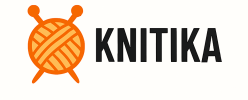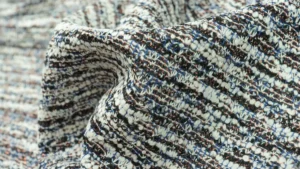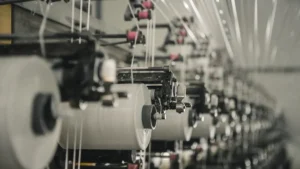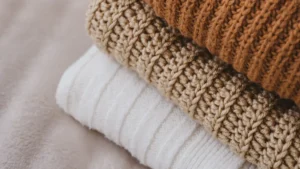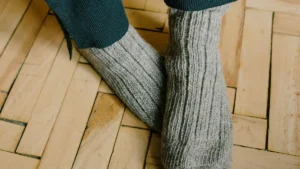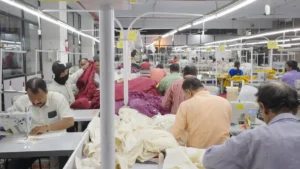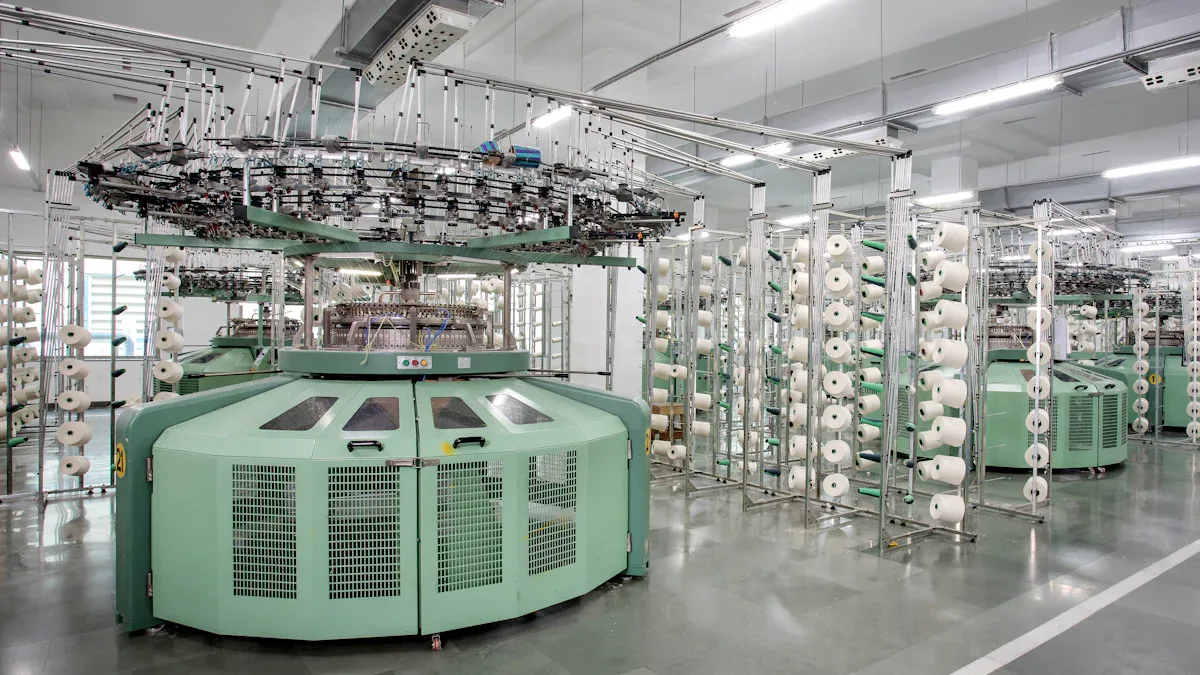
Portugal is recognized as the top knitwear manufacturer of women’s knitwear in the EU, producing 35% of all knitwear in the region. This makes Portugal’s output three times greater than that of Italy. The table below highlights Portugal’s leading position compared to other major countries:
Country | Production Share in EU Women’s Knitwear (2025) |
|---|---|
Portugal | 35% |
Italy | 11.7% |
Netherlands | 11% |
If you are looking for a top knitwear manufacturer, consider these ten leading companies in Portugal for 2025:
ASBX Group
Valerius Group
Calvelex
Friendly Factories
RTG Textiles
Lopes & Carvalho
TMR Fashion Clothing
Seam Factories
Magma Textil Group
Barceltricot
Key Takeaways
Portugal is the top country in the EU for making women’s knitwear. They make products that are high-quality and good for the environment. – The best Portuguese manufacturers use skilled workers and new machines. They also care about being eco-friendly. – Many companies take small orders and help with design. This helps new brands and brands that are growing. – Picking the right manufacturer means you must know what your brand needs. You should check their certifications and talk to them clearly. – Making samples and talking clearly helps build trust. It also makes sure production goes well from start to finish.
Portugal’s Knitwear Industry
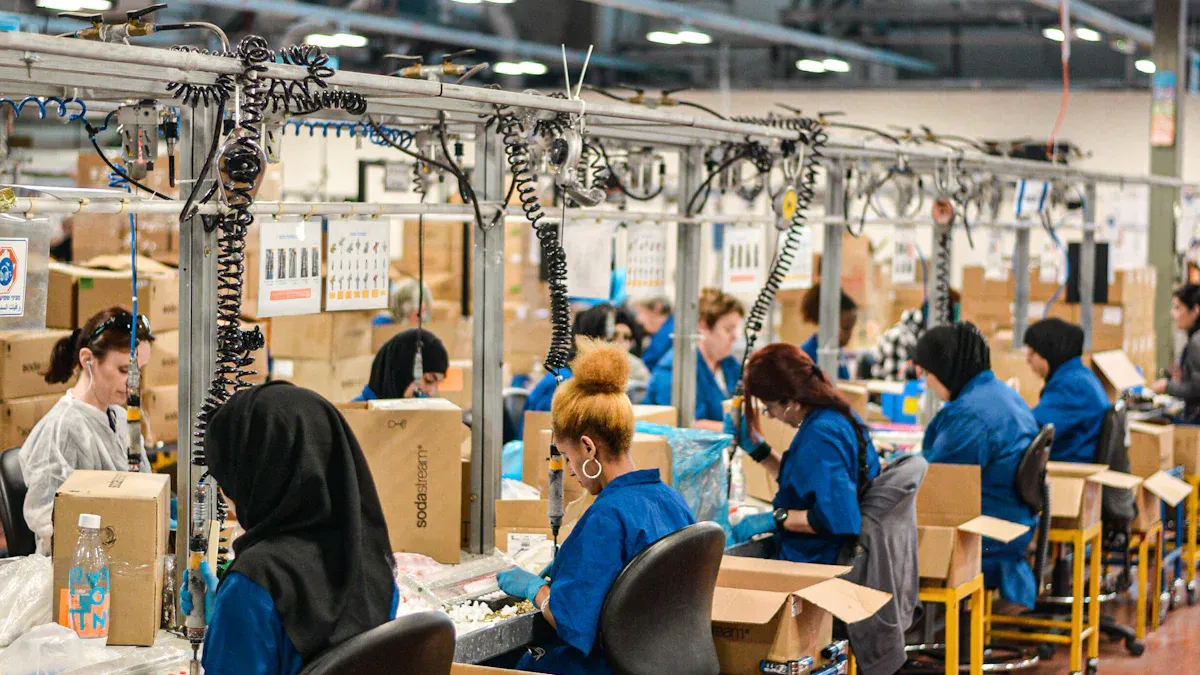
Quality and Craftsmanship
Portugal’s knitwear industry is known for great quality and skilled work. Factories use 100% fine ring-spun combed cotton and other top fabrics. Many manufacturers have certifications like ISO 9001, GOTS, and OEKO-TEX STANDARD 100. These show they follow high standards when making products. Quality checks happen at every step, from fabric checks to packing. Portuguese factories send out up to £7 billion in clothes each year, showing people around the world want their products. Many companies have been around for over 20 years and are often run by families. They mix old skills with new machines to make sure every item is made well. The industry helps small and medium businesses by offering flexible orders and quick shipping in Europe.
Tip: Choose manufacturers with certifications like GOTS or OEKO-TEX for extra trust in quality and safety.
Sustainability Focus
Sustainability is very important in Portugal’s knitwear sector. Companies use organic fibers and recycle textile waste to help the planet. The market listens to people who want eco-friendly clothes by using ethical ways to make garments and eco-responsible methods. Portugal’s clothing market keeps growing because more people want sustainable fashion. Experts think this growth will continue, with a focus on good materials and special designs from local culture. This care for the environment helps Portuguese knitwear brands get noticed around the world.
Innovation and Technology
Innovation is a big part of Portugal’s knitwear industry. The country’s textile cluster brings together tradition, manufacturing skills, and new research. More than 10% of textile companies make technical textiles, which are about 25% of all textile exports. Groups like CITEVE and CeNTI do research on nanomaterials and smart fabrics. Events like MODtissimo and iTechSTyle Showcase® show off new products and ideas, making the industry look good. The sector uses Industry 4.0 tech, smart systems, and quick market response to stay ahead. Northern Portugal is the main place for textile innovation, with strong teamwork between companies, universities, and research centers. This focus on technology and working together keeps Portugal as a top leader in knitwear manufacturing.
Top Knitwear Manufacturer List 2025
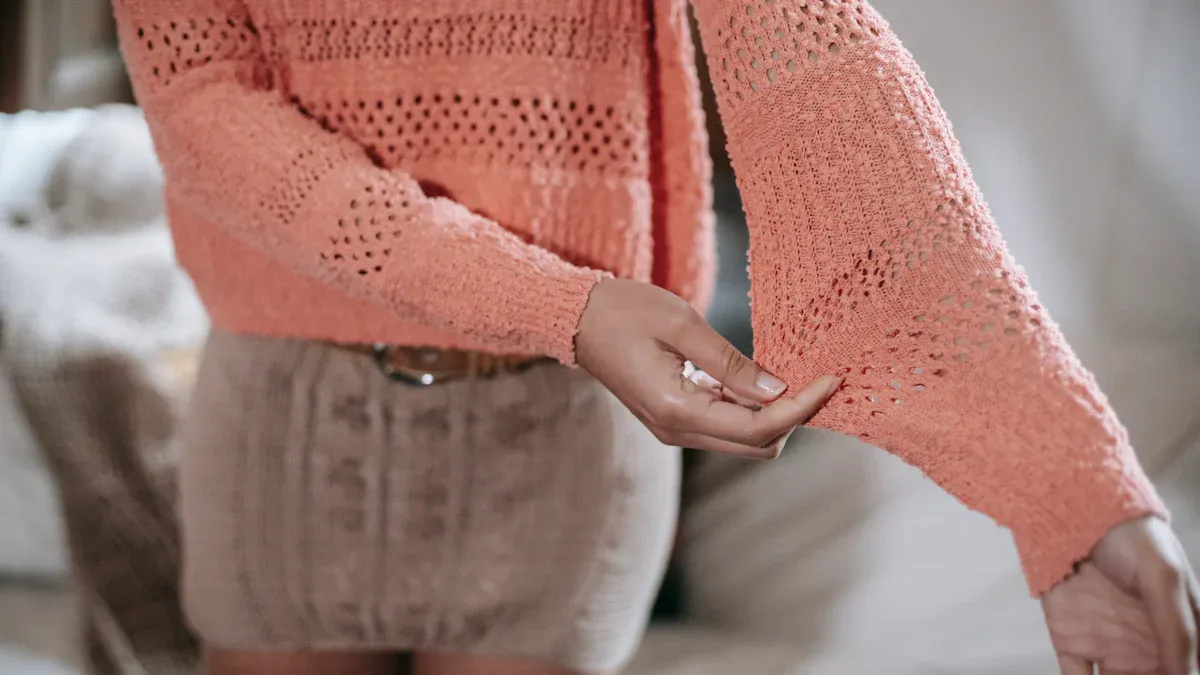
ASBX Group
ASBX Group is a top knitwear manufacturer in Portugal. The company started with fast fashion and now works with global brands. ASBX Group makes private label knitwear and helps from design to delivery. Their factories have advanced knitting machines and skilled workers. They use digital tools to track orders and check quality. ASBX Group uses organic cotton and recycled fibers in many items. They have certifications like GOTS and OEKO-TEX to show they care about sustainability. ASBX Group helps small brands by taking low minimum orders.
Contact: asbxgroup.com
Valerius Group
Valerius Group is known for new ideas and eco-friendly production. The company has several factories in northern Portugal. Valerius Group makes circular knits, jersey, and technical fabrics. They use a closed-loop recycling system to turn waste into new yarns. Valerius Group uses renewable energy and saves water with special technology. They work with big fashion brands in Europe. The company has GRS and GOTS certifications. Valerius Group also runs Valerius 360, a recycling plant that helps the circular economy.
Contact: valerius.pt
Calvelex
Calvelex is a family business with over 30 years of experience. The company makes knitwear and woven clothes for luxury and premium brands. Calvelex is known for careful work and strong quality control. Their factories have modern equipment and skilled artisans. Calvelex gives design help and can do flexible production runs. They use organic and recycled materials in many products. Calvelex has ISO 9001 and OEKO-TEX certifications. They train workers and help local communities.
Contact: calvelex.pt
Friendly Factories
Friendly Factories is a trusted partner for new and established brands. The company offers full-service knitwear manufacturing, from samples to shipping. Friendly Factories takes small and medium orders, which is good for startups. Their team helps with design, sourcing, and planning production. Friendly Factories uses eco-friendly fabrics and low-impact dyes. The company has GOTS and OEKO-TEX certifications. They care about transparency and fair labor.
Contact: friendlyfactories.com
RTG Textiles
RTG Textiles is strong in Portugal’s knitwear sector. The company makes many types of knitwear, like sweaters, dresses, and sportswear. RTG Textiles uses advanced knitting technology and skilled technicians. They are known for fast turnaround and flexible order sizes. RTG Textiles works with big retailers and boutique brands. The company uses organic cotton and recycled polyester in many products. RTG Textiles has ISO 14001 and OEKO-TEX certifications.
Contact: rtgtextiles.pt
Lopes & Carvalho
Lopes & Carvalho has been in the knitwear industry for over 25 years. The company makes high-quality knitwear for men, women, and children. Lopes & Carvalho uses Italian yarns and modern knitting machines. Their team pays close attention to finishing and details. Lopes & Carvalho offers custom development and private label services. The company uses eco-friendly materials and renewable energy. They have OEKO-TEX and ISO 9001 certifications.
Contact: lopesecarvalho.pt
TMR Fashion Clothing
TMR Fashion Clothing is known for flexible production and fast delivery. The company makes knitwear for fashion brands and retailers in Europe. TMR Fashion Clothing focuses on trendy designs and seasonal collections. Their factories use digital pattern-making and automated cutting. TMR Fashion Clothing uses organic and recycled fibers in many lines. The company has GOTS and OEKO-TEX certifications. They help local charities and train workers.
Contact: tmr.pt
Seam Factories
Seam Factories offers full-package knitwear manufacturing for global brands. The company focuses on quality, speed, and customer service. Seam Factories makes sweaters, cardigans, and accessories. Their team uses advanced knitting machines and strict quality checks. Seam Factories uses organic cotton and recycled yarns. The company has ISO 14001 and OEKO-TEX certifications. They use energy-saving equipment and work to reduce waste.
Contact: seamfactories.com
Magma Textil Group
Magma Textil Group is known for technical skill and new ideas. The company makes knitwear for sports, fashion, and lifestyle brands. Magma Textil Group uses seamless knitting and 3D design technology. They can make complex patterns and structures. Magma Textil Group uses recycled polyester and organic cotton. The company has GRS and OEKO-TEX certifications. They work with research centers to create new materials.
Contact: magmatextil.pt
Barceltricot
Barceltricot has over 40 years of experience in knitwear manufacturing. The company makes sweaters, cardigans, and knit accessories. Barceltricot uses high-quality yarns and skilled workers. They can handle both large and small orders. Barceltricot uses eco-friendly dyes and recycled fibers. The company has OEKO-TEX and ISO 9001 certifications. They help local schools and community projects.
Contact: barceltricot.pt
Note: Each top knitwear manufacturer in this list has special strengths. Some use advanced technology. Others focus on strong sustainability programs. Brands can find a partner for quality, speed, and eco-friendly production.
Manufacturer Comparison Table
Features Overview
The table below shows what each top knitwear manufacturer does best. It also lists their special skills and technology. This makes it easier for brands to pick the right partner for their needs.
Manufacturer | Specialties | Tech & Innovation | Flexible Orders | Design Support |
|---|---|---|---|---|
ASBX Group | Private label, fast fashion | Digital tracking, advanced knitting | Yes | Yes |
Valerius Group | Circular knits, technical | Closed-loop recycling, water-saving | Yes | Yes |
Calvelex | Luxury, premium brands | Modern equipment, artisan skills | Yes | Yes |
Friendly Factories | Full-service, startups | Eco-friendly dyes, transparency | Yes | Yes |
RTG Textiles | Sweaters, sportswear | Fast turnaround, tech knitting | Yes | Yes |
Lopes & Carvalho | Men, women, kids | Italian yarns, custom finishing | Yes | Yes |
TMR Fashion Clothing | Trendy, seasonal | Digital pattern, auto cutting | Yes | Yes |
Seam Factories | Sweaters, accessories | Energy-saving, strict QC | Yes | Yes |
Magma Textil Group | Sports, seamless, 3D | 3D design, research partnerships | Yes | Yes |
Barceltricot | Sweaters, accessories | Skilled workers, eco dyes | Yes | Yes |
Brands can look at this table to quickly compare each top knitwear manufacturer.
Sustainability Certifications
Portuguese knitwear manufacturers have strong sustainability certifications. These are checked by outside groups and must be renewed often. The certifications cover everything from the start to the end of making clothes.
Global Organic Textile Standard (GOTS): Checks organic textiles with full supply chain audits.
OEKO-TEX® Certifications: Includes STANDARD 100 for textile safety, STeP for sustainable production, and MADE IN GREEN for traceability.
Global Recycle Standard (GRS): Makes sure recycled content is used and good social and environmental rules are followed.
Fair Trade: Focuses on worker well-being and caring for the environment.
ISO 9001: Matches quality management and traceability.
Certification Name | Validity | Focus Areas |
|---|---|---|
3 years | Chemical management, environment, social responsibility | |
GOTS | 1 year | Organic textiles, transparency, traceability |
GRS | 1 year | Recycled content, social and environmental compliance |
ISO 9001 | 3 years | Quality management, risk management |
These certifications prove that each manufacturer’s sustainability claims are true and that they keep high standards.
Order Requirements
Most Portuguese manufacturers let brands order small amounts, so both new and big brands can work with them.
Manufacturer | MOQ (Approximate) | Sample Orders | Lead Time (weeks) |
|---|---|---|---|
ASBX Group | 100 pcs | Yes | 4-6 |
Valerius Group | 150 pcs | Yes | 5-7 |
Calvelex | 120 pcs | Yes | 5-8 |
Friendly Factories | 100 pcs | Yes | 4-6 |
RTG Textiles | 150 pcs | Yes | 5-7 |
Lopes & Carvalho | 120 pcs | Yes | 5-8 |
TMR Fashion Clothing | 100 pcs | Yes | 4-6 |
Seam Factories | 100 pcs | Yes | 4-7 |
Magma Textil Group | 150 pcs | Yes | 5-8 |
Barceltricot | 120 pcs | Yes | 5-8 |
Many top knitwear manufacturers in Portugal allow small orders. This helps new brands start with less risk.
Choosing a Top Knitwear Manufacturer
Assessing Your Needs
Each brand should know its main goals before picking a manufacturer. Companies must decide if they want summer knitwear, luxury items, or sportswear. They need to learn what customers like and what is popular now. Brands should set clear rules for judging, like yarn quality and cost. It helps to compare things, such as cotton jersey and polyester mesh. This lets brands see the good and bad of each choice. After looking at options, brands can order samples to test them. They should check if the samples meet what they want.
Tip: Brands with clear goals and rules find it easier to pick the right partner.
Evaluating Capabilities
A top knitwear manufacturer needs strong technical skills. This means knowing about yarns, machines, and checking quality. Brands should look for companies with good planning and creative ideas. Teamwork and talking well are very important for success. Companies should see if the manufacturer can handle timelines and quality checks. Speaking English helps everyone understand each other. Having regular meetings and full technical files helps things go smoothly.
Sustainability Considerations
Sustainability is now very important in the knitwear world. Brands should pick manufacturers that use organic or recycled fibers. Using eco-friendly dyes is also a good sign. The PERFECT FIT 3D knitting method helps cut down on waste. This way, clothes use less material and last longer. Manufacturers with GOTS, OEKO-TEX, or GRS certifications care about the environment.
Communication Tips
Good communication helps make a strong partnership. Brands should have regular check-ins and share technical files. Setting clear rules helps avoid confusion. Using English or learning some Portuguese can help everyone understand. Brands that watch progress and give feedback get better results. Talking well builds trust and helps brands work with a top knitwear manufacturer for a long time.
Getting Started with Portuguese Manufacturers
Making Contact
Brands should first find manufacturers with the right skills. This helps make better products and saves time. When brands contact a manufacturer, they should share details about their products. They need to say what fabric they want, show design drawings, and tell how many items they need. Being clear from the start helps everyone know what to expect. It also means there will be fewer changes later.
Manufacturers who answer quickly and are honest are often better partners.
Some companies do everything from making fabric to finishing clothes. These companies can check quality better and work faster.
Portugal has a long history in textiles, so brands can trust these partnerships.
Tip: Brands should pick manufacturers who want to work together and talk openly. This makes projects easier and gives better results.
Sampling Process
After first talking, brands usually ask for samples. Sampling lets both sides try out ideas and check quality before making lots of items. Portuguese manufacturers often use online tools and small factories to handle samples well. These tools help everyone see updates and make changes fast.
A normal sampling process has these steps:
Brands send technical files and design ideas.
Both sides look at fabric choices and color samples.
Brands check a sample to see if it fits and looks right.
Brands should give feedback fast to keep things moving. Quick and clear feedback helps manufacturers fix problems and finish on time.
Placing Orders
When the sample is good, brands can order more items. Portuguese manufacturers use computers to plan orders and manage production. This helps make products faster and control costs.
Most manufacturers let brands order small amounts, so new brands can start easily. Brands should check how long it takes, how to pay, and how shipping works before they order. Talking clearly at this stage helps everything go smoothly and makes sure items arrive on time.
Note: Getting updates and having clear deals helps stop problems and builds trust between brands and manufacturers for a long time.
Portugal’s knitwear industry is known for being high quality and modern. Many factories use smart systems like Smartex AI to check for mistakes and waste less. Skilled workers and smart spending help the industry stay ahead in fashion and technology. Brands can look at the comparison table to find the best knitwear manufacturer for them. Starting with clear contact and sample steps helps brands and factories work well together. Portugal is still a top place for making eco-friendly knitwear today.
FAQ
What is the typical minimum order quantity (MOQ) for Portuguese knitwear manufacturers?
Most top manufacturers in Portugal let you order small amounts. The usual minimum is between 100 and 150 pieces for each style. This makes it easier for new brands to start with less risk.
How long does production usually take from order to delivery?
Production usually takes between 4 and 8 weeks. The time depends on the company and how big the order is. Brands should ask about timing early so they can plan well.
Do Portuguese manufacturers offer sustainable knitwear options?
Many Portuguese manufacturers use organic cotton and recycled fibers. They also use eco-friendly dyes in their products. Most have certifications like GOTS, OEKO-TEX, or GRS. These show they care about making clothes in a safe way for the planet.
Can brands request samples before placing a full order?
All top Portuguese knitwear manufacturers let brands ask for samples. Sampling helps brands check the quality, fit, and design. This way, brands can be sure before making a big order.
How do brands communicate with Portuguese manufacturers?
Most manufacturers talk to brands in English.
Brands should send clear files and give feedback.
Regular updates and video calls help everyone work together.
Talking often and clearly helps build trust and get better results.
